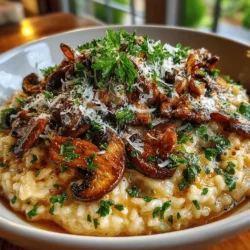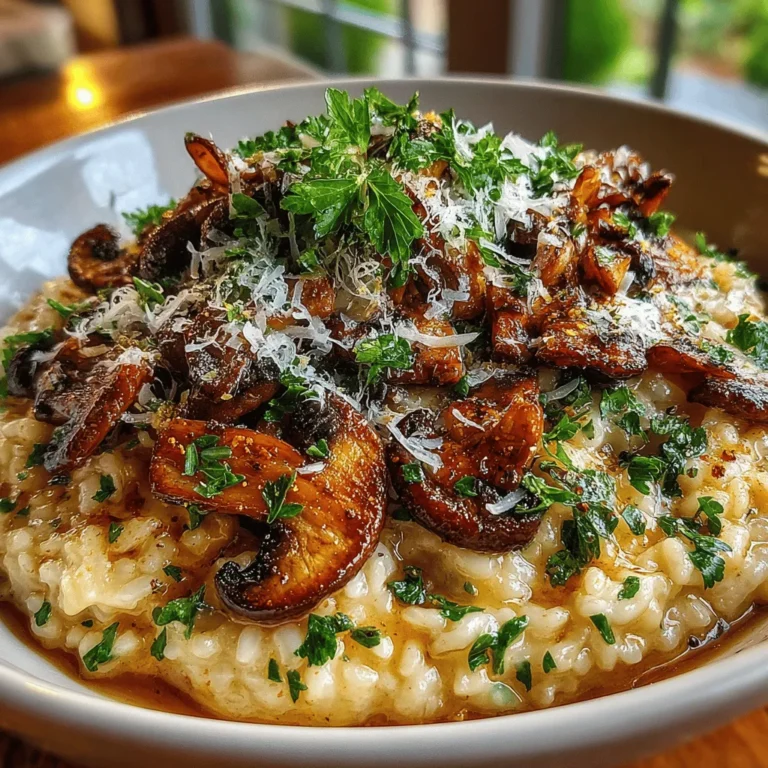Elegant Wild Mushroom Risotto Recipe: A Culinary Journey Through Italian Tradition
Risotto is a quintessential Italian dish that captures the essence of comfort food with its creamy texture and rich flavors. Among the myriad of variations, the Elegant Wild Mushroom Risotto stands out, offering a sophisticated blend of earthy mushroom notes and a luscious, buttery finish. This recipe not only showcases the beauty of seasonal ingredients but also invites home cooks to embrace the joy of creating a dish that is as delightful to prepare as it is to savor.
The Importance of Risotto in Italian Cuisine
Risotto holds a significant place in Italian gastronomy. Originating from the northern regions of Italy, particularly Lombardy and Piedmont, this dish is traditionally made with Arborio rice, a short-grain rice known for its high starch content. The slow cooking process allows the starch to release, resulting in a creamy, velvety texture that is both comforting and indulgent. Risotto is more than just a meal; it is a celebration of culinary heritage, reflecting the Italian philosophy of using simple, high-quality ingredients to create something extraordinary.
One of the most appealing aspects of risotto is its adaptability to different seasons and ingredients. With each change in season, chefs and home cooks alike can experiment with various vegetables, herbs, and proteins, making risotto a versatile canvas for culinary creativity. The Elegant Wild Mushroom Risotto is a perfect example of this philosophy, as it highlights the rich, earthy flavors of wild mushrooms that are often at their peak during the fall months.
Understanding Risotto
At its core, risotto is a creamy rice dish that is defined by its cooking technique rather than a specific set of ingredients. The key characteristic of risotto is its creamy consistency, achieved through the slow addition of warm broth while continuously stirring the rice. This method allows the rice to absorb the liquid gradually, resulting in a dish that is both comforting and luxurious.
The choice of rice is crucial in making a perfect risotto. Arborio rice is the most commonly used variety due to its unique properties. Its high starch content, combined with a firm texture, allows it to absorb flavors beautifully while maintaining a slight bite, or “al dente,” which is essential for an authentic risotto experience. Other varieties, such as Carnaroli and Vialone Nano, are also excellent choices, each bringing its own nuances to the dish.
The Star Ingredients
Arborio Rice
Arborio rice is the backbone of any risotto recipe. Its round, plump grains are capable of absorbing a significant amount of liquid, which contributes to the dish’s signature creaminess. When cooked, Arborio rice releases starch, which thickens the dish and creates that coveted risotto texture. For the best results, choose high-quality Arborio rice, as it can significantly impact the final outcome.
Wild Mushrooms: Nature’s Flavor Bombs
Wild mushrooms are the true stars of the Elegant Wild Mushroom Risotto. Varieties such as chanterelles, shiitakes, and porcini bring a depth of flavor and aroma that elevates the dish to new heights. Each type of mushroom offers its own unique taste profile, from the delicate sweetness of chanterelles to the robust earthiness of porcini. In addition to their culinary appeal, wild mushrooms are rich in nutrients, offering health benefits such as antioxidants, vitamins, and minerals.
The Importance of Broth
The flavor development in risotto is heavily influenced by the broth used during cooking. A well-made broth enhances the overall taste of the dish. While many recipes call for chicken broth, vegetable broth is an excellent vegetarian alternative that allows the earthy tones of the mushrooms to shine. When preparing your broth, aim for a low-sodium option to maintain control over the dish’s saltiness, as the flavors will concentrate during cooking.
The Role of White Wine
White wine plays a crucial role in the preparation of risotto, adding acidity and depth that balances the richness of the dish. A dry white wine, such as Sauvignon Blanc or Pinot Grigio, is ideal for this recipe. When incorporated after sautéing the mushrooms and aromatics, the wine helps to deglaze the pan, lifting any flavorful bits stuck to the bottom, and infuses the rice with a layer of complexity that elevates the dish.
Other Key Ingredients
Along with rice and mushrooms, several other ingredients contribute to the success of your Elegant Wild Mushroom Risotto. A generous amount of freshly grated Parmesan cheese brings a savory richness that complements the mushrooms perfectly. Heavy cream can be added for an extra touch of indulgence, creating a luxuriously creamy texture. Aromatics such as shallots and garlic are essential for building the foundational flavors of the dish, while fresh herbs like thyme or parsley can provide a vibrant finish.
Preparing the Broth
Before diving into the cooking process, it’s essential to prepare your broth properly. The temperature of the broth is crucial; using warm broth allows the rice to cook evenly and absorb flavors without shocking the grains. You can either make your own broth by simmering chicken or vegetables with herbs and spices or opt for a good-quality store-bought option.
To prepare a simple low-sodium broth, combine water with your choice of bones or vegetables, adding aromatics like onion, celery, and carrot. Allow the mixture to simmer for at least an hour to develop a rich flavor. Strain the broth and keep it warm on the stovetop, ready for use during the risotto cooking process. Maintaining an optimal broth temperature is key to achieving the desired creamy consistency in your risotto.
Sautéing the Mushrooms
The first step in crafting your Elegant Wild Mushroom Risotto is to sauté the mushrooms. This process not only enhances their flavor but also helps to develop a beautiful golden-brown color, which adds visual appeal to the dish.
Heat a generous amount of olive oil or unsalted butter in a large skillet over medium-high heat. Once the fat is hot, add the sliced mushrooms in a single layer, allowing them to sear without overcrowding the pan. This step is critical; if the mushrooms are too crowded, they will steam rather than brown. Cook the mushrooms for about 5-7 minutes, stirring occasionally, until they are golden and tender. Season them lightly with salt and pepper to amplify their natural flavors.
For maximum taste, consider adding a splash of your chosen white wine to the pan during the last minute of cooking the mushrooms. This will not only deglaze the pan but also infuse the mushrooms with the wine’s acidity, enhancing their depth of flavor.
Cooking the Aromatics
Once the mushrooms are perfectly sautéed, it’s time to shift your focus to the aromatics. In the same skillet, add finely chopped shallots and minced garlic, allowing them to cook in the residual heat and flavorful oils from the mushrooms. Sauté them gently until they become translucent and fragrant, typically 2-3 minutes. This step is essential as the aromatics lay the foundation for the overall flavor profile of the risotto, ensuring that each bite is infused with a harmonious blend of ingredients.
As you prepare to combine the rice with the sautéed mushrooms and aromatics, be ready to embark on the final steps of crafting your Elegant Wild Mushroom Risotto. The next phases will involve the careful addition of Arborio rice, the gradual incorporation of your prepared broth, and the transformative magic that happens as the dish comes together into a creamy, decadent masterpiece.
{{image_2}}
Risotto is a timeless Italian dish that embodies comfort and sophistication. This Elegant Wild Mushroom Risotto showcases the rich flavors of earthy mushrooms melded beautifully with creamy Arborio rice. In this section, we will explore the critical steps to perfecting your risotto, including the role of aromatics, toasting the rice, deglazing with wine, and finishing touches that elevate your dish to an elegant masterpiece.
Role of Onions and Garlic in Building the Base Flavor
Onions and garlic are essential aromatics in many recipes, and they play a pivotal role in building the flavor base for your risotto. Onions provide a sweet, slightly tangy flavor that caramelizes beautifully when sautéed, while garlic infuses the dish with a warm, aromatic essence. The balance of these ingredients enhances the overall depth of flavor in your risotto.
Tips for Achieving the Perfect Sautéed Onion Texture
1. Choose the Right Onion: Yellow onions are typically the best choice for risotto as they become sweet when cooked. Avoid using red onions, which can overpower the dish with their sharpness.
2. Heat Control: Begin by heating your olive oil or butter over medium heat. Allow it to warm up before adding your diced onions. This ensures that the onions sauté rather than steam.
3. Cook Slowly: Sauté the onions until they are translucent and soft, about 5-7 minutes. Stir occasionally to prevent them from sticking to the pan and browning too quickly. The goal is to develop a sweet flavor without burning.
4. Add Garlic at the Right Time: Garlic should be added after the onions have softened. Cook the garlic for about 1-2 minutes, just until fragrant, to avoid burning. Overcooked garlic can turn bitter, which will negatively impact your risotto.
Toasting the Arborio Rice
Toasting the Arborio rice before adding liquid is a crucial step that enhances the nutty flavor and helps to achieve a creamy texture. This process allows the rice to absorb flavors better and contributes to the overall richness of the dish.
Best Practices for Stirring and Monitoring the Rice During This Stage
1. Add the Rice: Once your onions and garlic are perfectly sautéed, add the Arborio rice to the pan. Stir the rice continuously for about 2-3 minutes. This helps to coat the grains in the flavorful oils and brings out the unique aroma of the rice.
2. Watch for Slight Translucence: The rice should become slightly translucent around the edges while remaining white at the center. This indicates that the grains are ready for the next step.
3. Avoid Overcooking: While toasting the rice, it’s essential to keep stirring to prevent it from sticking to the pan or burning. You want the rice to toast evenly, so maintain a consistent stirring motion throughout this process.
Deglazing with White Wine
Deglazing is an essential technique for developing a deeper flavor profile in your risotto. By adding white wine, you not only introduce acidity, which balances the richness but also lifts the fond (the browned bits) stuck to the pan.
How to Properly Incorporate Wine and Recognize When It’s Absorbed
1. Choose the Right Wine: A dry white wine, such as Sauvignon Blanc or Pinot Grigio, works best. Avoid sweet wines, which can alter the dish’s flavor.
2. Add the Wine: After toasting the rice, pour in about ½ cup of white wine. Stir the mixture and allow the wine to simmer. This will help lift the flavorful bits from the bottom of the pan.
3. Absorption Check: Keep stirring until the wine is mostly absorbed by the rice. This usually takes around 2-3 minutes. You should notice the rice becoming creamier and more aromatic as the wine incorporates.
Gradual Addition of Broth
The key to perfect risotto lies in the gradual addition of warm broth. This technique allows the rice to release its starches slowly, creating a rich, creamy texture without the need for heavy cream.
Step-by-Step Guide to the Gradual Broth Incorporation Technique
1. Prepare the Broth: Ensure your vegetable or chicken broth is warm and ready before you start adding it to the rice. This prevents the cooking process from stalling.
2. Add the Broth Gradually: Begin by adding just enough broth to cover the rice. Stir gently and allow the rice to absorb the liquid. This should take about 2-3 minutes.
3. Continue Adding Broth: Once the liquid is mostly absorbed, add another ladleful of broth. Repeat this process, stirring frequently and allowing the rice to absorb the liquid before adding more. This gradual approach is crucial for achieving that creamy risotto texture.
Tips for Achieving Creamy, Al Dente Risotto
– Timing is Key: The entire process of gradually adding broth should take around 18-20 minutes. Keep an eye on the rice’s texture; it should be tender yet still have a slight bite (al dente).
– Texture Recognition: Taste the rice as you go. You want it to be creamy, with a bit of firmness in the center of each grain. Adjust the timing based on your stove’s heat level and the rice’s progress.
Finishing Touches: Cream and Cheese
The finishing touches of your risotto make all the difference in achieving a luxurious texture and flavor. Incorporating heavy cream and Parmesan cheese creates a rich, velvety finish that elevates your dish.
How to Fold in Sautéed Mushrooms and Ensure Even Distribution
1. Prepare the Mushrooms: Sauté your wild mushrooms separately in a bit of olive oil or butter until they are golden brown and cooked through. This process enhances their flavor and texture.
2. Add Cream and Cheese: Once the rice is cooked to perfection, remove it from the heat. Stir in about ¼ cup of heavy cream and ½ cup of freshly grated Parmesan cheese. This will create a rich, creamy consistency.
3. Incorporate the Mushrooms: Gently fold in the sautéed wild mushrooms, ensuring they are evenly distributed throughout the risotto.
Adjusting Seasoning for the Perfect Balance of Flavors
Before serving, taste your risotto and adjust the seasoning as needed. Add salt and freshly cracked black pepper to enhance the flavors. A squeeze of fresh lemon juice can also brighten the dish and balance the richness.
Garnishing and Serving Suggestions
The presentation of your risotto can significantly enhance the dining experience. Here are a few creative tips for serving:
Creative Presentation Tips for Serving Risotto
1. Use a Ring Mold: For a refined presentation, pack the risotto into a ring mold, then carefully lift it off to create a beautiful tower of risotto on each plate.
2. Plate with Style: Serve your risotto in shallow bowls, allowing the creamy texture to shine. A drizzle of high-quality olive oil on top can add a lovely sheen.
How to Enhance Visual Appeal with Fresh Parsley and Lemon Zest
1. Fresh Herbs: Garnish each serving with fresh chopped parsley to introduce a pop of color and freshness.
2. Lemon Zest: A sprinkle of lemon zest over the top adds brightness and aroma, making the dish visually appealing and flavorful.
Suggestions for Pairing with Wine or Side Dishes
Pair your Elegant Wild Mushroom Risotto with a crisp white wine, such as a Sauvignon Blanc or a light-bodied Pinot Noir, to complement the dish’s earthy flavors. You might also consider serving it alongside a simple arugula salad dressed with lemon vinaigrette for a refreshing contrast.
Conclusion
This Elegant Wild Mushroom Risotto is a celebration of flavors and textures that embodies the essence of Italian cuisine. The methodical process of sautéing, toasting, and gradually incorporating broth yields a dish that is both creamy and rich, yet light on the palate. The satisfaction of creating homemade risotto is unmatched, as you witness the transformation of simple ingredients into a culinary masterpiece.
As you embark on this culinary journey, don’t hesitate to experiment with variations by incorporating different mushrooms, herbs, or even proteins such as chicken or shrimp. The beauty of risotto lies in its versatility, and each variation offers a new opportunity for creativity. Enjoy the process, and savor each bite of your elegant creation. Happy cooking!


